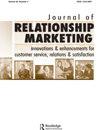零售权益、价值和关系利益在建立零售业B2B关系中的作用
Q2 Business, Management and Accounting
引用次数: 13
摘要
摘要本文旨在检验在B2C中广泛研究的变量是否有助于在B2B市场中建立牢固的关系。此外,它还分析了零售商之间存在的与主要供应商采购百分比相关的差异。通过对零售商店经理与主要供应商关系的个人调查,通过PLS估计了一个结构方程模型,以检验零售权益、价值、关系利益、信任和承诺之间的假设关系。进行多组分析,以测试从主要供应商采购的百分比的调节作用。三种类型的关系利益对关系价值的影响是不相等的。特别是,特殊待遇福利和社会福利以及零售权益成为零售商与其主要供应商之间关系的主要价值驱动因素。从主要供应商采购的比例在其中一些关系中起着调节作用。本研究提供的证据表明,在零售商与其主要供应商的关系中,零售权益有助于关系价值的创造。关系利益与建立B2B关系相关,因为特殊待遇和社会利益对价值有正向影响,而价值与信任和承诺正相关。为了与顾客建立牢固的关系,零售商的供应商应主要集中精力建立品牌资产,并提供证据证明在提供的服务之外存在特殊待遇利益,因为这最终会影响顾客的信任和承诺。本文章由计算机程序翻译,如有差异,请以英文原文为准。
The Role of Retail Equity, Value and Relational Benefits in Building B2B Relationships in Retailing
Abstract The present paper aims to examine if variables widely studied in B2C contribute to building strong relationships in B2B markets. Moreover, it analyzes the existence of differences across retailers related to percentage of purchases from the main supplier. Through a personal survey to retail store managers regarding their relationships with their main suppliers, a structural equation model is estimated through PLS to test the hypothesized relations between retail equity, value, relational benefits, trust, and commitment. A multi-group analysis is performed to test the moderating role of the percentage of purchases from the main supplier. Three types of relational benefits identified have unequal influence on relationship value. In particular, special treatment benefits and social benefits, together with retail equity, emerge as the main drivers of value in the relationship between retailers and their main suppliers. The percentage of purchases from the main supplier plays a moderating role in some of these relations. This research provides evidence in the sense that, in the relations held by retailers with their main suppliers, retail equity contributes to relationship value creation. Relational benefits are relevant in building B2B relations since special treatment and social benefits have a positive influence on value that is positively related to trust and commitment. To build strong relations with their customers, suppliers of retailers should mainly concentrate their efforts on building brand equity and providing evidence of the existence of special treatment benefits beyond the service delivered, in view of its ultimate influence on customer trust and commitment.
求助全文
通过发布文献求助,成功后即可免费获取论文全文。
去求助
来源期刊

Journal of Relationship Marketing
Business, Management and Accounting-Marketing
CiteScore
10.20
自引率
0.00%
发文量
7
期刊介绍:
The Journal of Relationship Marketing is a quarterly journal that publishes peer-reviewed (double-blind) conceptual and empirical papers of original works that make serious contributions to the understanding and advancement of relationship and marketing theory, research, and practice. This academic journal is interdisciplinary and international in nature. Topics of interest (not limited to): Evolution and life cycle of RM; theoretical and methodological issues in RM; types of RM, networks and strategic alliances; internal communication, quality, trust, commitment, satisfaction, loyalty, and dissolution in RM; applications of RM in different disciplines and industries; international perspectives in RM; RM strategies in services economy, higher education, and e-commerce; RM, technology, and the Web; profitability and RM; case studies and best practices in RM. If you are interested in becoming an ad-hoc reviewer, please e-mail a brief statement indicating your area of expertise and interest along with a copy of your CV.
 求助内容:
求助内容: 应助结果提醒方式:
应助结果提醒方式:


